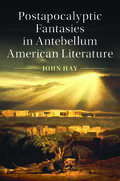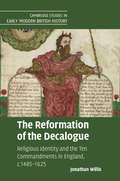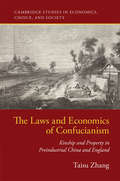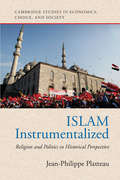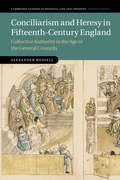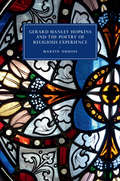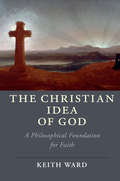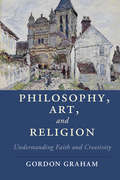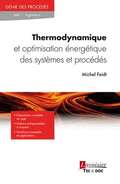- Table View
- List View
Cambridge Medieval Textbooks: Christianity, Judaism, and Islam
by Christine Caldwell AmesJews, Christians, and Muslims in the Middle Ages were divided in many ways. But one thing they shared in common was the fear that God was offended by wrong belief. Medieval Heresies: Christianity, Judaism, and Islam is the first comparative survey of heresy and its response throughout the medieval world. Spanning England to Persia, it examines heresy, error, and religious dissent - and efforts to end them through correction, persuasion, or punishment - among Latin Christians, Greek Christians, Jews, and Muslims. With a lively narrative that begins in the late fourth century and ends in the early sixteenth century, Medieval Heresies is an unprecedented history of how the three great monotheistic religions of the Middle Ages resembled, differed from, and even interrelated with each other in defining heresy and orthodoxy.
Cambridge Middle East Studies: Hizbullah and the Politics of Remembrance
by Bashir SaadeBorn out of the Israeli occupation of the South of Lebanon, the political armed group Hizbullah is a powerful player within both Lebanon and the wider Middle East. Understanding how Hizbullah has, since the 1980s, developed its own reading of the nature of the Lebanese state, national identity and historical narrative is central to grasping the political trajectory of the country. By examining the ideological production of Hizbullah, especially its underground newspaper Al Ahd, Bashir Saade offers an account of the intellectual continuity between the early phases of Hizbullah's emergence onto the political stage and its present day organization. Saade argues here that this early intellectual activity, involving an elaborate understanding of the past and history had a long lasting impact on later cultural production, one in which the notion and practice of Resistance has been central in developing national imaginaries.
Cambridge Studies in American Literature and Culture: Postapocalyptic Fantasies in Antebellum American Literature (Cambridge Studies in American Literature and Culture #164)
by John HayEven before the Civil War, American writers were imagining life after a massive global catastrophe. For many, the blank slate of the American continent was instead a wreckage-strewn wasteland, a new world in ruins. Bringing together epic and lyric poems, fictional tales, travel narratives, and scientific texts, Postapocalyptic Fantasies in Antebellum American Literature reveals that US authors who enthusiastically celebrated the myths of primeval wilderness and virgin land also frequently resorted to speculations about the annihilation of civilizations, past and future. By examining such postapocalyptic fantasies, this study recovers an antebellum rhetoric untethered to claims for historical exceptionalism - a patriotic rhetoric that celebrates America while denying the United States a unique position outside of world history. As the scientific field of natural history produced new theories regarding biological extinction, geological transformation, and environmental collapse, American writers responded with wild visions of the ancient past and the distant future.
Cambridge Studies in Contentious Politics: Religious War and Religious Peace in Early Modern Europe
by Te Brake Wayne P.Religious War and Religious Peace in Early Modern Europe presents a novel account of the origins of religious pluralism in Europe. Combining comparative historical analysis with contentious political analysis, it surveys six clusters of increasingly destructive religious wars between 1529 and 1651, analyzes the diverse settlements that brought these wars to an end, and describes the complex religious peace that emerged from two centuries of experimentation in accommodating religious differences. Rejecting the older authoritarian interpretations of the age of religious wars, the author uses traditional documentary sources as well as photographic evidence to show how a broad range Europeans - from authoritative elites to a colorful array of religious 'dissenters' - replaced the cultural 'unity and purity' of late-medieval Christendom with a variable and durable pattern of religious diversity, deeply embedded in political, legal, and cultural institutions.
Cambridge Studies in Early Modern British History: Anglican Enlightenment
by William J. BulmanThis is an original interpretation of the early European Enlightenment and the religious conflicts that rocked England and its empire under the later Stuarts. In a series of vignettes that move between Europe and North Africa, William J. Bulman shows that this period witnessed not a struggle for and against new ideas and greater freedoms, but a battle between several novel schemes for civil peace. Bulman considers anew the most apparently conservative force in post-Civil War English history: the conformist leadership of the Church of England. He demonstrates that the church's historical scholarship, social science, pastoral care and political practice amounted not to a culturally backward spectacle of intolerance, but to a campaign for stability drawn from the frontiers of erudition and globalization. In seeking to sever the link between zeal and chaos, the church and its enemies were thus united in an Enlightenment project, but bitterly divided over what it meant in practice.
Cambridge Studies in Early Modern British History: Religious Identity and the Ten Commandments in England, c.1485–1625 (Cambridge Studies in Early Modern British History)
by Jonathan WillisThe Reformation of the Decalogue tells two important but previously untold stories: of how the English Reformation transformed the meaning of the Ten Commandments, and of the ways in which the Ten Commandments helped to shape the English Reformation itself. Adopting a thematic structure, it contributes new insights to the history of the English Reformation, covering topics such as monarchy and law, sin and salvation, and Puritanism and popular religion. It includes, for the first time, a comprehensive analysis of surviving Elizabethan and Early Stuart 'commandment boards' in parish churches, and presents a series of ten case studies on the Commandments themselves, exploring their shifting meanings and significance in the hands of Protestant reformers. Willis combines history, theology, art history and musicology, alongside literary and cultural studies, to explore this surprisingly neglected but significant topic in a work that refines our understanding of British history from the 1480s to 1625.
Cambridge Studies in Early Modern British History: The Political Bible in Early Modern England
by Kevin KilleenThis illuminating new study considers the Bible as a political document in seventeenth-century England, revealing how the religious text provided a key language of political debate and played a critical role in shaping early modern political thinking. Kevin Killeen demonstrates how biblical kings were as important in the era's political thought as any classical model. The book mines the rich and neglected resources of early modern quasi-scriptural writings - treatise, sermon, commentary, annotation, poetry and political tract - to show how deeply embedded this political vocabulary remained, across the century, from top to bottom and across all religious positions. It shows how constitutional thought, in this most tumultuous era of civil war, regicide and republic, was forged on the Bible, and how writers ranging from King James, Joseph Hall or John Milton to Robert Filmer and Thomas Hobbes can be better understood in the context of such vigorous biblical discourse.
Cambridge Studies in Economics, Choice, and Society: Kinship and Property in Preindustrial China and England (Cambridge Studies in Economics, Choice, and Society)
by Taisu ZhangTying together cultural history, legal history, and institutional economics, The Laws and Economics of Confucianism: Kinship and Property in Pre-Industrial China and England offers a novel argument as to why Chinese and English pre-industrial economic development went down different paths. The dominance of Neo-Confucian social hierarchies in Late Imperial and Republican China, under which advanced age and generational seniority were the primary determinants of sociopolitical status, allowed many poor but senior individuals to possess status and political authority highly disproportionate to their wealth. In comparison, landed wealth was a fairly strict prerequisite for high status and authority in the far more 'individualist' society of early modern England, essentially excluding low-income individuals from secular positions of prestige and leadership. Zhang argues that this social difference had major consequences for property institutions and agricultural production.
Cambridge Studies in Economics, Choice, and Society: Religion and Politics in Historical Perspective (Cambridge Studies in Economics, Choice, and Society)
by Jean-Philippe PlatteauIn this book, economist Jean-Philippe Platteau addresses the question: does Islam, the religion of Muslims, bear some responsibility for a lack of economic development in the countries in which it dominates? In his nuanced approach, Platteau challenges the widespread view that the doctrine of Islam is reactionary in the sense that it defends tradition against modernity and individual freedom. He also questions the view that fusion between religion and politics is characteristic of Islam and predisposes it to theocracy. He disagrees with the substantivist view that Islam is a major obstacle to modern development because of a merging of religion and the state, or a fusion between the spiritual and political domains. But he also identifies how Islam's decentralized organization, in the context of autocratic regimes, may cause political instability and make reforms costly.
Cambridge Studies in Islamic Civilization: Gender Hierarchy in the Qurʾān
by Karen BauerThis book explores how medieval and modern Muslim religious scholars ('ulamā') interpret gender roles in Qur'ānic verses on legal testimony, marriage, and human creation. Citing these verses, medieval scholars developed increasingly complex laws and interpretations upholding a male-dominated gender hierarchy; aspects of their interpretations influence religious norms and state laws in Muslim-majority countries today, yet other aspects have been discarded entirely. Karen Bauer traces the evolution of their interpretations, showing how they have been adopted, adapted, rejected, or replaced over time, by comparing the Qur'ān with a wide range of Qur'ānic commentaries and interviews with prominent religious scholars from Iran and Syria. At times, tradition is modified in unexpected ways: learned women argue against gender equality, or Grand Ayatollahs reject sayings of the Prophet, citing science instead. This innovative and engaging study highlights the effects of social and intellectual contexts on the formation of tradition, and on modern responses to it.
Cambridge Studies in Islamic Civilization: Sexual Violation in Islamic Law
by Hina AzamThis book provides a detailed analysis of Islamic juristic writings on the topic of rape and argues that classical Islamic jurisprudence contained nuanced, substantially divergent doctrines of sexual violation as a punishable crime. The work centers on legal discourses of the first six centuries of Islam, the period during which these discourses reached their classical forms, and chronicles the juristic conflict over whether or not to provide monetary compensation to victims. Along with tracing the emergence and development of this conflict over time, Hina Azam explains evidentiary ramifications of each of the two competing positions, which are examined through debates between the Ḥanafī and Mālikī schools of law. This study examines several critical themes in Islamic law, such as the relationship between sexuality and property, the tension between divine rights and personal rights in sex crimes, and justifications of victim's rights afforded by the two competing doctrines.
Cambridge Studies in Islamic Civilization: The Economics of Ottoman Justice
by Metin Coşgel Boğaç ErgeneDuring the seventeenth and eighteenth centuries, the Ottoman Empire endured long periods of warfare, facing intense financial pressures and new international mercantile and monetary trends. The Empire also experienced major political-administrative restructuring and socioeconomic transformations. In the context of this tumultuous change, The Economics of Ottoman Justice examines Ottoman legal practices and the sharia court's operations to reflect on the judicial system and provincial relationships. Metin Coşgel and Boğa#65533; Ergene provide a systematic depiction of socio-legal interactions, identifying how different social, economic, gender and religious groups used the court, how they settled their disputes, and which factors contributed to their success at trial. Using an economic approach, Coşgel and Ergene offer rare insights into the role of power differences in judicial interactions, and into the reproduction of communal hierarchies in court, and demonstrate how court use patterns changed over time.
Cambridge Studies in Law and Society: China and Islam
by Matthew S. ErieChina and Islam examines the intersection of two critical issues of the contemporary world: Islamic revival and an assertive China, questioning the assumption that Islamic law is incompatible with state law. It finds that both Hui and the Party-State invoke, interpret, and make arguments based on Islamic law, a minjian (unofficial) law in China, to pursue their respective visions of 'the good'. Based on fieldwork in Linxia, 'China's Little Mecca', this study follows Hui clerics, youthful translators on the 'New Silk Road', female educators who reform traditional madrasas, and Party cadres as they reconcile Islamic and socialist laws in the course of the everyday. The first study of Islamic law in China and one of the first ethnographic accounts of law in postsocialist China, China and Islam unsettles unidimensional perceptions of extremist Islam and authoritarian China through Hui minjian practices of law.
Cambridge Studies in Medieval Life and Thought: Bishops, Authority and Community in Northwestern Europe, c. 1050–1150
by Ott John S.This important new study of episcopal office and clerical identity in a socially and culturally dynamic region of medieval Europe examines the construction and representation of episcopal power and authority in the archdiocese of Reims during the sometimes turbulent century between 1050 and 1150. Drawing on a wide range of diplomatic, hagiographical, epistolary and other narrative sources, John S. Ott considers how bishops conceived of, and projected, their authority collectively and individually. In examining episcopal professional identities and notions of office, he explores how prelates used textual production and their physical landscapes to craft historical narratives and consolidate local and regional memories around ideals that established themselves as not only religious authorities but also cultural arbiters. This study reveals that, far from being reactive and hostile to cultural and religious change, bishops regularly grappled with and sought to affect, positively and to their advantage, new and emerging cultural and religious norms.
Cambridge Studies in Medieval Life and Thought: Collective Authority in the Age of the General Councils (Cambridge Studies in Medieval Life and Thought: Fourth Series)
by Alexander RussellThe general councils of the fifteenth century constituted a remarkable political experiment, which used collective decision-making to tackle important problems facing the church. Such problems had hitherto received rigid top-down management from Rome. However, at Constance and Basle, they were debated by delegates of different ranks from across Europe and resolved through majority voting. Fusing the history of political thought with the study of institutional practices, this innovative study relates the procedural innovations of the general councils and their anti-heretical activities to wider trends in corporate politics, intellectual culture and pastoral reform. Alexander Russell argues that the acceptance of collective decision-making at the councils was predicated upon the prevalence of group participation and deliberation in small-scale corporate culture. Conciliarism and Heresy in Fifteenth-Century England offers a fundamental reassessment of England's relationship with the general councils, revealing how political thought, heresy, and collective politics were connected.
Cambridge Studies in Medieval Life and Thought: History, Frankish Identity and the Framing of Western Ethnicity, 550–850
by Helmut ReimitzThis pioneering study explores early medieval Frankish identity as a window into the formation of a distinct Western conception of ethnicity. Focusing on the turbulent and varied history of Frankish identity in Merovingian and Carolingian historiography, it offers a new basis for comparing the history of collective and ethnic identity in the Christian West with other contexts, especially the Islamic and Byzantine worlds. The tremendous political success of the Frankish kingdoms provided the medieval West with fundamental political, religious and social structures, including a change from the Roman perspective on ethnicity as the quality of the 'Other' to the Carolingian perception that a variety of Christian peoples were chosen by God to reign over the former Roman provinces. Interpreting identity as an open ended process, Helmut Reimitz explores the role of Frankish identity in the multiple efforts through which societies tried to find order in the rapidly changing post-Roman world.
Cambridge Studies in Nineteenth-Century Literature and Culture: Gerard Manley Hopkins and the Poetry of Religious Experience (Cambridge Studies in Nineteenth-Century Literature and Culture #108)
by Martin DuboisThis nuanced yet accessible study is the first to examine the range of religious experience imagined in Hopkins's writing. By exploring the shifting way in which Hopkins imagines religious belief in individual history, Martin Dubois contests established views of his poetry as a unified project. Combining detailed close readings with extensive historical research, Dubois argues that the spiritual awareness manifest in Hopkins's poetry is varied and fluctuating, and that this is less a failure of his intellectual system than a sign of the experiential character of much of his poetry's thought. Individual chapters focus on biblical language and prayer, as well as on the spiritual ideal seen in the figures of the soldier and the martyr, and on Hopkins's ideas of death, judgement, heaven and hell. Offering fresh interpretations of the major poems, this volume reveals a more diverse and exploratory poet than has been recognised.
Cambridge Studies in Religion, Philosophy, and Society: A Philosophical Foundation for Faith (Cambridge Studies in Religion, Philosophy, and Society)
by Keith WardIn this book, eminent theologian Keith Ward takes a fresh look at the ancient philosophy of Idealism, connects it with findings in modern science, and shows that a combination of good science, good philosophy, and a passion for truth and goodness, can underpin religious faith. Going back to first principles, he argues for the Idealist view that all knowledge begins with experience. Critically examining the idealism of Plato, Kant, and Hegel, Ward shows how this philosophy is strengthened by a knowledge of modern physics, and how it can lead to a new and vivid presentation of Christian faith. A work of philosophical rigour that makes clear the rational nature of belief in God, this book challenges the easy assumptions of materialism and the relativity of truth that undermine both science and religion. Ward writes in an accessible and readable style that gives new life and practical usefulness to idealist philosophy.
Cambridge Studies in Religion, Philosophy, and Society: Ethics and Religion
by Harry J. GenslerMany people question whether God is the source of morality. Under divine command theory, God's will creates the moral order, and therefore ethical truths are true because of God's will. Under natural law, on the other hand, some ethical truths do not depend on God's will, and yet perhaps they depend on his reason or creation. Ethics and Religion develops strong, defensible, and original versions of both divine command theory and natural law. The book also discusses ethics and atheism: how atheists object on ethical grounds to belief in God and how they view ethics. The book defends belief in God from criticisms and analyzes related concepts, such as practical reason, the golden rule, ethics and evolution, the problem of evil, and the fine-tuning argument.
Cambridge Studies in Religion, Philosophy, and Society: Psychology, Religion, and Spirituality
by Fraser WattsPsychology, Religion, and Spirituality provides readers with a critical overview of what psychology tells us about religion and spirituality. It is concise without being simplistic, and the first such broad overview to be published for some years. Fraser Watts recognizes that 'religion' is complex and multi-faceted, taking different forms in different people and contexts. The book presents a broad view of psychology; whatever kind of psychology you are interested in, you will find it covered here, from biological to social, and from experimental to psychoanalytic. It focuses particularly on the varied concepts that psychologists have employed to make sense of religion and subjects them to critical examination. The book is also concerned with practical applications, helping those engaged in religious ministry. It will be of interest to undergraduates and general readers, as well as specialists in religious studies, psychology, and philosophy of religion.
Cambridge Studies in Religion, Philosophy, and Society: Reason, Revelation, and Devotion
by William J. WainwrightReason, Revelation, and Devotion argues that immersion in religious reading traditions and their associated spiritual practices significantly shapes our emotions, desires, intuitions, and volitional commitments; these in turn affect our construction and assessments of arguments for religious conclusions. But far from distorting the reasoning process, these emotions and volitional and cognitive dispositions can be essential for sound reasoning on religious and other value-laden subject matters. And so western philosophy must rethink its traditional antagonism toward rhetoric. The book concludes with discussions of the implications of the earlier chapters for the relation between reason and revelation, and for the role that the concept of mystery should play in philosophy in general, and in the philosophy of religion and philosophical theology in particular.
Cambridge Studies in Religion, Philosophy, and Society: Understanding Faith and Creativity (Cambridge Studies in Religion, Philosophy, and Society)
by Gordon GrahamAt a time when religion and science are thought to be at loggerheads, art is widely hailed as religion's natural spiritual ally. Philosophy, Art, and Religion investigates the extent to which this is true. It charts the way in which modern conceptions of 'Art' often marginalize the sacred arts, construing choral and instrumental music, painting and iconography, poetry, drama, and architecture as 'applied' arts that necessarily fall short of the ideal of 'art for art's sake'. Drawing on both history of art and philosophical aesthetics, Graham sets out the historical context in which the arts came to free themselves from religious patronage, in order to conceptualize the cultural context in which religious art currently finds itself. The book then relocates religious art within the aesthetics of everyday life. Subsequent chapters systematically explore each of the sacred arts, using a wide range of illustrative examples to uncover the ways in which artworks can illuminate religious faith, and religious content can lend artworks a deeper dimension.
Cambridge Studies in Social Theory, Religion and Politics: Islam and Democracy in Indonesia
by Jeremy MenchikIndonesia's Islamic organizations sustain the country's thriving civil society, democracy, and reputation for tolerance amid diversity. Yet scholars poorly understand how these organizations envision the accommodation of religious difference. What does tolerance mean to the world's largest Islamic organizations? What are the implications for democracy in Indonesia and the broader Muslim world? Jeremy Menchik argues that answering these questions requires decoupling tolerance from liberalism and investigating the historical and political conditions that engender democratic values. Drawing on archival documents, ethnographic observation, comparative political theory, and an original survey, Islam and Democracy in Indonesia demonstrates that Indonesia's Muslim leaders favor a democracy in which individual rights and group-differentiated rights converge within a system of legal pluralism, a vision at odds with American-style secular government but common in Africa, Asia and Eastern Europe.
Cambridge Studies in Social Theory, Religion and Politics: Secular Conversions
by Damon MayrlWhy does secularization proceed differently in otherwise similar countries? Secular Conversions demonstrates that the institutional structure of the state is a key factor shaping the course of secularization. Drawing upon detailed historical analysis of religious education policy in the United States and Australia, Damon Mayrl details how administrative structures, legal procedures, and electoral systems have shaped political opportunities and even helped create constituencies for secular policies. In so doing, he also shows how a decentralized, readily accessible American state acts as an engine for religious conflict, encouraging religious differences to spill into law and politics at every turn. This book provides a vivid picture of how political conflicts interacted with the state over the long span of American and Australian history to shape religion's role in public life. Ultimately, it reveals that taken-for-granted political structures have powerfully shaped the fate of religion in modern societies.
Cambridge Studies in Social Theory, Religion, and Politics: Godless Democrats and Pious Republicans?
by Ryan L. ClaassenDo Evangelical activists control the Republican Party? Do secular activists control the Democratic Party? In Godless Democrats and Pious Republicans?, Ryan Claassen carefully assesses the way campaign activists represent religious and non-religious groups in American political parties dating back to the 1960s. By providing a new theoretical framework for investigating the connections between macro social and political trends, the results challenge a conventional wisdom in which recently mobilized religious and Secular extremists captured the parties and created a God gap. The new approach reveals that very basic social and demographic trends matter far more than previously recognized and that mobilization matters far less. The God gap in voting is real, but it was not created by Christian Right mobilization efforts and a Secular backlash. Where others see culture wars and captured parties, Claassen finds many religious divisions in American politics are artifacts of basic social changes. This very basic insight leads to many profoundly different conclusions about the motivations of religious and non-religious activists and voters.

